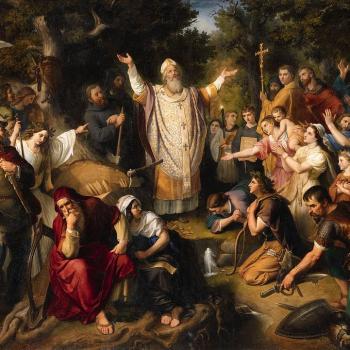Reconciling a Changing World
The world that we live in today is faced with new ethical challenges everyday. We find that the patterns that have helped us live our lives for decades or even centuries at a time are quickly shifting away and new paradigms of normalcy have emerged. We are faced with new questions of sexuality, science, biology, technology, globalization, diversity, pluralism, and a host of other challenges that we simply have no easy answers to. The world is becoming polarized, discordant, and is in desperate need of reconciliation. In the midst of this tumolt there is a temptation to succumb to the bitterness of pragmatic disenchantment, or settle for the euphoric oblivion of ignorant naiveté. I do not believe that these are the only options for us. I believe that the best hope for a way forward that the world has in these times is The Christian Church.
The Church?
The assertion that hope is in The Christian Church might strike many as odd. In the minds of contemporary people today that church is an old and antiquated body that is bogged down with centuries of superstitious traditions and is too clunky and cumbersome to navigate the shifting tides of the contemporary world today. I however have a different perspective.
I am a christian, and I believe that in all times and in all places the greatest hope that the world has for reconciliation is in the person of Jesus Christ. In many ways the world will never know peace until it knows it through Christ, as Augustine once wrote, “our hearts our restless until they rest in [God].” I believe that on the cross Jesus Christ became the reconciler of all things to God and in Him all things can find their reconciliation with one another. Jesus is both the power and the paradigm of reconciliation. In him we see an example of the best way to live, and in him we find the power to do it. I believe the church is the best hope of reconciliation that the world has today, because I believe that the church is a path to Jesus.
The Church Is A Path To The Jesus Paradigm
The church has wrestled with what it means to be a follower of Jesus through hundreds and hundreds of years. They have thought about what it means to follow Jesus through epochs and empires, and in every continent, country, and under every constitution. The church had learned not just how to read about the ministry of reconciliation in Jesus, but how to live it. By being in conversation with the church you enter into a conversation that spans millenia that all focuses on how to follow Jesus. The church has long realized that they are in a position where they must constantly take the themes of the gospel and the heart of the christian ethic and improvise with them as the context that they live in changes. Through this, the church, as masterful improvisation artists has taken the paradigm of Jesus and reworked it into the story that the world tells over and over. They have lived with the ethical mandates of the gospel and have struggled over how and how not to do it for many many years. In the wisdom gleaned through both their successes and failures we can see a way to live like Christ, not only today but also in the shifting sands that will surly come.
The church is a path to Jesus’ Power
Even more than the valuable wisdom the church offers, I have hope in the church because in them I see power. Jesus did not simply show us how to live he made a way to join him in living that way. The heart of the Christian ethic is not simply imitation but conjugation. The church offers us a place where we can meet with Christ both in a community and in the sacraments. In church we are fed with the bread of life in the Eucharist and joined in the death that reconciles all things to him in baptism. It is only as we live into THAT reality that we can experience the power needed to actually see reconciliation take place where new challenges arise. Without this power all of our efforts at reconciliation will be met with frustration, and failure.
A Case Study: Osama Bin Laden
All this talk of church so far is only theory. Some might argue that in light of recent abuses in the church and statistics that Christians are no “better” than other people that the church has proven itself to have lost sight of Jesus and has become powerless. This critique is too real to ignore. The church is a broken institution just like anything else, but that is not because of the ways that we follow Jesus, but the ways we don’t. In spite of all the missteps and stumbling in the church, it is hard to deny, that there are times that the church GETS IT. They pick up on the story that God is trying to live through them and they deliver deliver a brilliant performance of the Gospel.
I recently saw this in the response of the Vatican to the assassination of Osama Bin Laden.
“Osama bin Laden, as we all know, bore the most serious responsibility for spreading divisions and hatred among populations, causing the deaths of innumerable people, and manipulating religions for this purpose. In the face of a man’s death, a Christian never rejoices, but reflects on the serious responsibilities of each person before God and before men, and hopes and works so that every event may be the occasion for the further growth of peace and not of hatred.” -Vatican Press Office
As much of the rest of the western world rejoiced in the death of Osama (including, unfortunately some in the church that seemed to have missed their lines) they Catholic Church responded brilliantly. They recognized that Osama was a sinner in need of God’s mercy, and that in his death there was a close to a chapter of human history that was very dark at times, but they emphasized even more strongly that Osama was a person who had the dignity of all men and women made in the image of God. They reminded us that, regardless of how much a person might hurt us or the world, as reconcilers we must never rejoice in the death of a person, because death is an enemy that is defeated when the reconciling work of Christ is consummated. As ministers of that reconciliation we must sorrow in violence, even violence against the purveyors violent.
Being Vocational Christians
So how should we live as ministers of reconciliation? How should we work out the ethical mandates of the Gospel of Jesus Christ today? We need to live as if our lives are actually part of what God is doing. We need to live out whatever setting we find ourselves in as a holy vocation. We need to join in the conversation of improvisation with the church; taking the story that the world tells us and reincorporate God’s truth into them. As people that believe that God will reconcile us in the final consummation of the kingdom, when we are wronged we should start the work of radical forgiveness. This way we can still name evil when we see it, but are able to move beyond retribution and actually give up our desire to respond with evil. We are called, in every vocation, to cultivate a culture of virtue around us. By doing so we will join with the church in declaring that even as what we do shifts to how and why we do it does not. Most importantly its important to stay in the church, for in the church we hear the hope in the Gospel declared, join with a community that has promised to support us, and meet with Jesus, who continually empowers us. In the church we find a way to engage the world with real power to change the world. This is why I have hope in the church.













